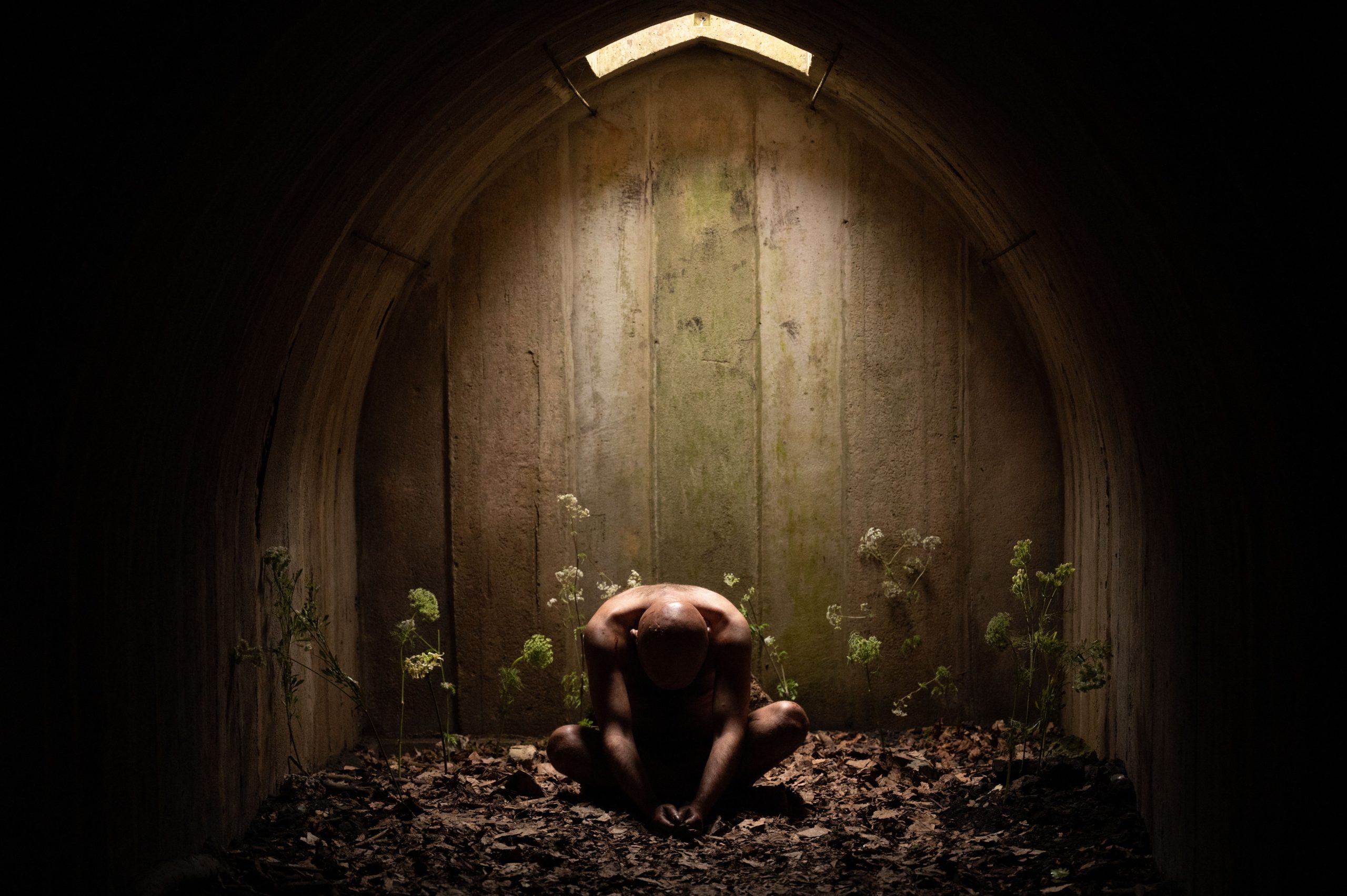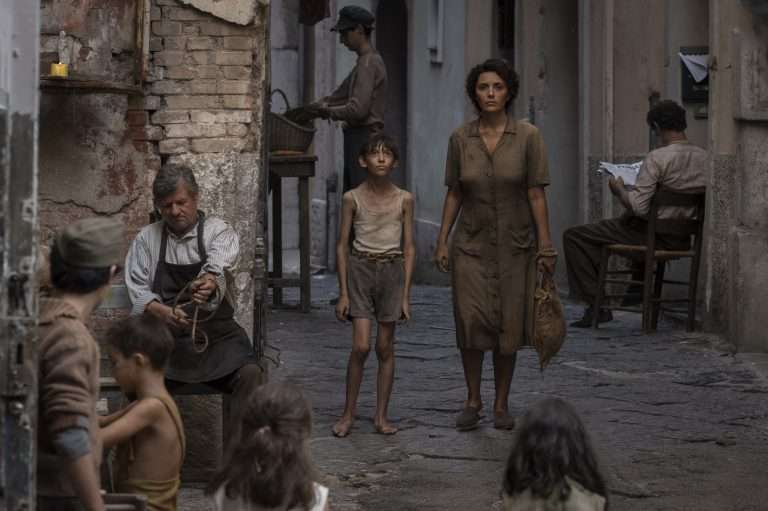Men (2022) Movie Ending Explained & Themes Analysed: With ‘Men’, the interest in folk horror that was piqued by ‘Midsommar’ reaches full circle. If the latter was emblematic of a need for community as a way of ridding oneself of abuse and trauma, the former looks at this riddance through the perspective of the individual, which prioritizes the agency of one’s own self. It is fitting then that ‘Men’ too comes under the banner of A24. Garland’s venture away from sci-fi doesn’t deprive him of his innate eye for visual splendour. ‘Men’ is a lush film, a showcase for the crispness of digital cinematography and with images that are bound to stay with the viewer, as are its horrors, unique and horrifying to the core.
Men (2022) Movie Plot Summary & Synopsis:
Harper, a young Londoner, books a stay at this gorgeous country house, possibly 500 years old according to its owner, Geoffrey. She has splurged too much on this two weeks-long vacation, as she admits to her friend Riley but the latter believes it’s fine. Especially since the vacation is meant to be a psychological convalescence for Harper. She has undergone a terrible tragedy. Her husband died having fallen from their building. It was a gruesome death as we’re shown. Not only did the fall kill him, but he also impaled his arm on a spear top fence and broke his ankle. In fact, what is most troublesome about his death is the ambiguity. Did he die having slipped while trying to make his way back to their apartment after he was locked out following a terrible fight or did he, in the process of making his way into their apartment, let go of his grip and kill himself, something he had threatened to do earlier?
Some time has certainly passed between this incident and Harper’s arrival in the village of Cotson. It’s a splendid house, set in a village that seems to have come straight out of the stories about ‘Merrie England’. But things are hardly how they seem. The men, who seem to make up the entirety of the sparsely populated village’s inhabitants, all look the same (all of them played by Rory Kinnear), something Harper doesn’t notice. A naked man, with mossy skin, soon starts stalking her and his arrest doesn’t solve anything. Soon, all hell breaks loose as Harper becomes a target of all these people, emotionally and physically. So all she can do is fight her way out of a vacation that instead of helping her overcome her trauma, repeatedly reinforces it.
Men (2022) Movie Themes Analysed:
Trauma and Guilt:
Harper’s husband’s death is a fairly prolonged affair as we see it portrayed in a non-linear fashion. When she asks him for a divorce, he threatens to kill himself and encumber her with the guilt of his death. This he justifies on the grounds that if despite this ‘warning’, as he calls it, she proceeds to divorce him, it would show him how little his life means to her. Then, when his presence turns scary, her expression of it to a friend makes him physically abusive, following which she throws him out. At this point, he turns desperate and this leads to his death, which is a highly ambiguous one as we never find out if he acted on his words or accidentally died. The expression on his face as he passed Harper on his way down to the street points to the latter. But that doesn’t matter.
What matters is Harper’s confrontation with that trauma, something from which she wants to distance herself through this holiday yet she is ironically made to face it in a visceral fashion, through it. Her playful echo in the tunnel being rendered into an eerie piece of music played as the horrors pile up, shows how little respite the village is capable of providing. One of the most powerful depictions of this is when in self-defense, Harper stabs the naked man’s hand who then, in pulling it out of the mail slot, rips it into two in a way similar to the injury James suffered on his fall.
It is clear that she doesn’t blame herself. Rationally she shouldn’t and we see that James is clearly an emotionally unstable man. Yet the tinge of guilt that obviously exists, in being magnified by the vicar, shows how each figure in Cotson is an embodiment of negative quality of her husband. We see very little of James but enough to deduce the layers of his abuse. There is the naked man, inconsiderately intrusive, something James is shown to be when he forces Harper to unlock her phone.
Geoffrey constantly confuses her title, referring to her as ‘Mrs.’ despite her having clarified that she is separated from her husband. This echoes James’s inability to separate Harper’s individual identity from that of her as his wife. The police officer is indifferent to the danger she is under as was James indifferent to her feelings. Samuel, the school kid, wants Harper to play with her and when she refuses, he starts cursing at her. This sense of entitlement is exactly what James portrays when he is forcing her into a corner to stop her from divorcing him. The vicar manipulates her words to make her feel guilty, echoing James’s emotional abuse directed at her when he threatens to kill himself if she tries to divorce him and burden her with the guilt.
All the Mythological references in Men (2022) Movie Explained:
During the film’s long climactic fiesta of horror, the vicar walks into the washroom where Harper is, attempting to rape her. Here, he quotes sections from two poems. The first, ‘A shudder in the loins engenders there/The broken wall, the burning roof and tower/And Agamemnon dead’ is from W.B.Yeats’s ‘Leda and the Swan’. The vicar calls himself a swan, which is what Zeus disguised himself as while raping Leda. The rape of Leda led to the birth of Helen (and three other children but that’s not needed here).
Helen’s abduction by Paris led her brother-in-law Agamemnon to lead a Greek expedition against Troy that began the epochal Trojan War, marking the beginning of classical history. While going to war, Agamemnon offended Artemis and in order to ensure his troops’ survival, killed his daughter Iphigenia as a sacrifice. Agamemnon is eventually killed by Clytemnestra, his wife, and Helen’s human half-sister, for this. In his poem, Yeats shows the beginning of Western history as being a product of an act as heinous as rape, this cynical viewpoint echoing the fact that it was written after the First World War, an event that saw the beginning of the end of the West’s claim to moral, political and economic supremacy.
The other quotation ‘I must be won, that cannot win,/Yet lost were I not won;/For beauty hath created been/T’ undo, or be undone’ is from Samuel Daniel’s ‘Ulysses and the Sirens’. Ulysses (the Roman name of Odysseus), on his way back to Ithaca from the Trojan War, came across the sirens. These were female sea creatures who tempted sailors with otherworldly pleasures through their singing, but which was only a trap to lead them to their death.
In the poem, Ulysses has a dialogue with a siren who tries to lure him by promising a life of ease and comfort. But he is concerned with attaining fame and honor, through his own toil, something that he will not gain if he gives himself to the comforts she promises. The siren, having failed to lure him, says these lines in dejection, stating that a siren (by extension, a beautiful woman), is meant to be won by men and loses if she is not won by one, and that beauty is meant to destroy or itself be destroyed.
In both these quotations, there is a stark indictment of the status of women. The Trojan War, one that has historically been viewed as a product of a woman’s infidelity, is the first justification that the vicar gives for the act he is about to commit. In his second quotation, he speaks of an antiquated notion about women being property meant to be won. By quoting incidents from classical history, the vicar is attempting to illustrate that his odious actions have their precedent in history, echoing the film’s overarching theme about the ways of the world being entirely dictated by men and the subsequent subjugation of women.
When Harper first arrives at the cottage, she takes an apple from the tree in the garden, without the landlord, Geoffrey’s permission, an act he constantly jokes about as being deserving of punishment. This is another instance of mythology’s indictment of women as troublesome and bedeviled, referring to Eve stealing the apple from the Tree of Knowledge against God’s wish, leading to mankind’s expulsion from the Garden of Eden. Through each of these instances, we’re made to face how across history, women have been unjustly and wrongly accused of crimes affecting humanity as a whole which would then serve as justification for their disparaging social status.
Green Man and Sheela-Na-Gig:
When Harper wanders into the church in Cotson, there is an ancient-looking drinking fountain in the chancel. It’s made out of stone and has two carvings. On the side facing the nave is the carving of the Green Man and on the other side of it, facing the altar is the carving of the Sheela na gig. These carvings, or the figures they depict repeatedly come up during the film’s dreamlike sequences – once when the camera enters the eye socket of a dead deer and during Harper’s visions that occur on breathing the pollen blown at her by the naked trespasser. Both these figures have their origins in pagan mythology. The Green Man is viewed as symbolic of rebirth and fertility. On the other hand, the Sheela na gig, with its exaggerated focus on breasts and vagina, the two distinguishing biological characteristics of femininity, is interpreted most commonly (there is no concrete interpretation of it) as a warning against lust.
These two symbols serve as anomalies against nature. On the one hand, lies the symbol of the Green Man, a man, symbolizing fertility, an utterly absurd idea. It deprives women of this biological ability exclusive to them while exalting man as the center of creation, a factually incorrect notion. On the other hand, lies the aspect of grotesquely exaggerating feminine body parts, becoming a mockery of femininity and the sanctity of childbirth by presenting them as ugly and repulsive. In both cases, there’s a clear patriarchal belittling of the female anatomy and its functions. The fact that this object is presented in the middle of a church, a historically patriarchal space, again reiterates the film’s most acute concern – this idea of the world being entirely defined and presented through the eyes of men. The idea of men actually being creators, though, has an almost comically dark interpretation at the end of the film.
Men (2022) Movie Ending Explained:
Her attempt to escape having been thwarted, Harper is on the brink of despair at which point the naked man arrives, having evolved into the Green Man. Here begins a disgustingly graphic relay race of giving birth. The Green Man’s stomach starts to swell up, after which his perineum splits open into a vagina, from which Samuel is born. Samuel then gives birth to the vicar through his navel. The vicar then gives birth to Geoffrey through his back, who then births James from his mouth.
Harper has become emotionally sterilized at this point and sits down with him, who has apparently come back from the afterlife to guilt-trip her (again). Tired, Harper asks James what he wants from her and he replies with ‘Your love.’ She derisively says ‘Yeah.’ The action shifts to the next morning when Riley arrives at the scene of the carnage, visibly pregnant and notices Harper sitting in the garden.
The various parts of their body from which the men of the village keep giving birth to each other vindicates the Green Man as a symbol of fertility. It scoffs at the biological inadequacy of men to give birth, leading to the characters doing so from all parts of their body, thereby ridiculing the vanity of the figure’s symbolism. If, as previously mentioned, the villagers can be seen as the embodiments of James’s traits, then him being born at the end is the reverse of this view, whereby he becomes a composite of their characteristics. And, viewing these characters as personifications of traits means that the births become symbolic of what men can indeed reproduce – the habits, biases, beliefs, deficiencies, pride, and practices inherited by each generation through the continuation of patriarchy’s hegemony.
We never get to see what Harper does to James but it is implied that she kills him, given that she no longer has the axe with her when Riley finds him. Similar to ‘Midsommar’, and in line with the tradition of folk horror, this becomes a mode of catharsis that depicts her ridding herself from her cycle of abuse, except this time through her own agency, unlike James’s accident/suicide which wrongly and constantly kept getting pinned on her.
When Riley arrives, Harper is holding a small leaf as she smiles at her, not the axe anymore. She has, in all probability, killed James using the very weapon that Riley had pointed out to her earlier during a video call, therefore elevating her importance in Harper’s struggle to break free from her husband’s maltreatment. Riley’s pregnancy becomes a reclamation of nature and its laws, liberating us from the disgust experienced by the graphic abomination depicted minutes prior to it.








